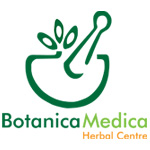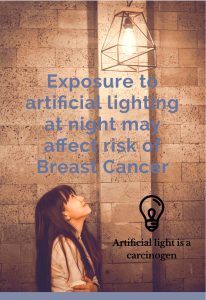ARTIFICIAL LIGHT AT NIGHT AND BREAST CANCER
It seems that an easy and perhaps effective way to lower risk of breast cancer may be to reduce or avoid exposure to artificial lighting at night. It’s that simple. A handful of recent studies confirm what we’ve long suspected….light pollution is a significant risk for breast cancer. Artificial light is a carcinogen.
The Portnov study reported that light at night was correlated with incidence of breast cancer in women in Connecticut.1 The researchers reported a significant association between light at night and breast cancer risk. Women living in areas with the greatest light at night had a 63% greater risk of breast cancer compared to women living in areas with the lowest light.
Blind women, because they use less electric lighting, have a lower risk of breast cancer.2 Women who work night shifts are at greater risk for breast cancer. A 2015 meta-analysis (is the statistical procedure for combining data from multiple studies) of 16 prospective cohort studies reported that increased morbidity and all-cause mortality in breast cancer corresponded with number of years engaged in night work.3 In a recently published French case-control study the risk for ER+ and PR+ breast cancer doubled, and risk for HER2+ cancers nearly tripled in women working nights shifts.4
The first time I noticed this idea of measuring light at night was in Kloog’s 2008 study. They used NASA nighttime satellite photos to estimate the LAN levels in Israel and reported a strong association with breast cancer rates, a 73% higher breast cancer incidence in the bright communities compared to dimmer communities.5
Something as simple as closing shutters or drawing the blinds at bedtime may reduce breast cancer risk by 18%.6
Given the weight of the evidence we need to start treating light at night as a carcinogenic environmental pollutant and strive to reduce exposure.
At Botanica Medica our Naturopaths come across lots of interesting studies and are always updating their knowledge. If you would like to make an appointment with one of our Naturopaths call Botanica Medica on 8271-1827 today. They are only to happy to share the knowledge they have gained through their studies and patient outcomes. Botanica Medica is located at 97 Glen Osmond Road, Eastwood.
About the Author
Jacob Schor ND, FABNO, is a graduate of National College of Naturopathic Medicine, Portland, Oregon, and now practices in Denver, Colorado. He served as president to the Colorado Association of Naturopathic Physicians and is on the board of directors of both the Oncology Association of Naturopathic Physicians and the American Association of Naturopathic Physicians. He is recognized as a fellow by the American Board of Naturopathic Oncology. He serves on the editorial board for the International Journal of Naturopathic Medicine, Naturopathic Doctor News and Review (NDNR), and Integrative Medicine: A Clinician’s Journal. In 2008, he was awarded the Vis Award by the American Association of Naturopathic Physicians. His writing appears regularly in NDNR, the Townsend Letter, and Natural Medicine Journal, where he is the Abstracts & Commentary editor.
References
1. Portnov BA, Stevens RG, Samociuk H, Wakefield D, Gregorio DI. Light at night and breast cancer incidence in Connecticut: An ecological study of age group effects. Sci Total Environ. 2016 Dec 1;572:1020-1024.
2. Stevens RG. Working against our endogenous circadian clock: Breast cancer and electric lighting in the modern world. Mutat Res. 2009 Nov-Dec;680(1-2):106-8.
3. Lin X, Chen W, Wei F, Ying M, Wei W, Xie X. Night-shift work increases morbidity of breast cancer and all-cause mortality: a meta-analysis of 16 prospective cohort studies. Sleep Med. 2015 Nov;16(11):1381-7.


Recent Comments